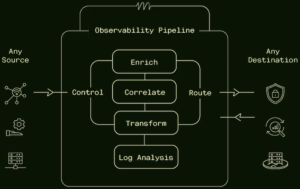
Mezmo’s Observability Pipeline Promises to Stop Runaway Data Flow

The vast amount of machine generated data created by the digital activities of businesses can be overwhelming to those striving to derive its value. With ever larger and more complex applications, greater consumer demand for a smoother digital experience, and the rise of cloud and microservices architectures, it seems the mighty rivers of observability data are now rushing continuously.
One company looking to harness the deluge of observability data into a manageable stream is Mezmo, formerly known as LogDNA. The company recently unveiled its new Observability Pipeline, a solution designed to centralize the flow of observability data from various sources while adding context and routing it to appropriate destinations.
“Teams across the organization need to easily centralize data from multiple sources, transform it to drive actionability, protect their budget, and empower everyone to manage that data with appropriate oversight. Doing so gives them actionable insights and triggers they can use to enhance agility, efficiency, and security,” the company said in a blog.
 Last year the company released a report that revealed 74% of companies are struggling to achieve true observability, despite investing heavily in tools, with 38% admitting to spending $300,000 or more annually. Mezmo says it realized it occupied a unique position for solving observability challenges through its technical foundation, a log management SaaS, built on Kubernetes, that IBM incorporated into its global cloud computing framework. The company says its new pipeline integrates features of its log management platform, including search, alerting, and visualization capabilities.
Last year the company released a report that revealed 74% of companies are struggling to achieve true observability, despite investing heavily in tools, with 38% admitting to spending $300,000 or more annually. Mezmo says it realized it occupied a unique position for solving observability challenges through its technical foundation, a log management SaaS, built on Kubernetes, that IBM incorporated into its global cloud computing framework. The company says its new pipeline integrates features of its log management platform, including search, alerting, and visualization capabilities.
Mezmo states the Observability Pipeline ingests and routes data from any source (cloud platforms, Syslog, Fluentd, Logstash, etc.) and delivers it to destinations such as Splunk, S3, and Mezmo’s Log Analysis platform. The pipeline’s control features simplify the management of multiple sources and destinations while protecting against runaway data flow, according to Mezmo. The company claims its solution allows teams to reduce the number of tools needed for log management and ingestion while increasing visibility and access, enabling better management and prediction of costs.
Observability data is not always in a usable format for those who need it, or it may be missing context or be difficult to locate, slowing down important decisions. Mezmo affirms its pipeline contains several processors to enrich and transform data for various use cases to filter and encrypt the most important data for the job. The solution ostensibly cuts log volume by removing duplicate events and filtering for specific log types to be dropped from the stream, which can reduce costs. Teams can also optimize data flows and transform data into consumable formats for each destination. Mezmo says data from aggregated sources is searchable from a user-friendly interface, and automatic and custom parsers, enrichment, correlation, and alerting capabilities can make that data more actionable.
“Data provides a competitive advantage, but organizations struggle to extract real value. First-generation observability data pipelines focus primarily on data movement and control, reducing the amount of data collected, but fall short on delivering value. Preprocessing data is a great first step,” said Mezmo CEO Tucker Callaway. “We’ve built on that foundation and our success in making log data actionable to create a smart observability data pipeline that enriches and correlates high volumes of data in motion to provide additional context and drive action.”
Mezmo announced its rebranding from LogDNA this past May, stating its new corporate identity reflects its expanding capabilities and vision for observability.
Related Items:
Observability and AIOps Tools Rise with Big MELT Data
LogDNA Research Shows 74 Percent of Companies Fail to Achieve True Observability
Companies Drowning in Observability Data, Dynatrace Says
































